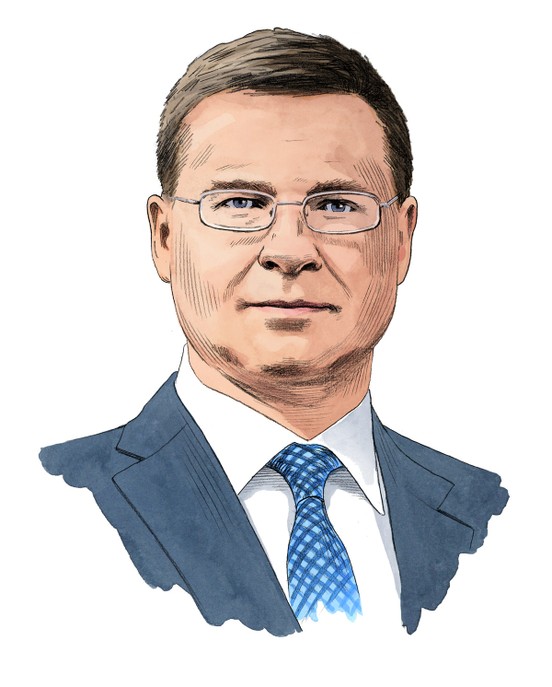Q&A with Valdis Dombrovskis
Valdis Dombrovskis
European Commission Executive-Vice President for an Economy that Works for People

Amid the COVID-19 crisis, we asked key policymakers from across the European Union for their insights and views on policy priorities and outlook for Europe’s economic recovery.
“We need to focus on preserving the productive capacity of the European economy by supporting companies and people’s incomes.”
Valdis Dombrovskis
About Valdis Dombrovskis
What is one of your career highlights?
As Prime Minister of Latvia, I had to deal with the global financial crisis and prepare Latvia’s euro area accession. Dealing with the crisis was very difficult; we had to take very tough decisions and measures, but it needed to be done. The euro introduction in the country was a positive highlight. That’s something I believe was the right choice. It was challenging to get the economic conditions right, to convince the public. There are lessons from all of those crises that we can use today, from which we can learn.
How do you unwind?
Latvia has many hundreds of kilometres of empty, sandy beaches that I like to walk along. And in Brussels, because of the lockdown, there is little traffic, so I have taken to cycling to work and back. Usually there’s lots of congestion and pollution, but now it’s nice.
What inspires you?
There are many people who have given me inspiration in different times of life, and it would be difficult to name them all. I would definitely say that the European project is a continued source of inspiration to me. I grew up when Latvia was occupied by the Soviet Union and it is much different now – I am convinced that Latvia’s future is in Europe. Especially at times like these when we are facing a crisis, Europe pulls together to overcome it.
“We have made it very clear that the European Green Deal and the goal of climate neutrality by 2050 holds.”
Valdis Dombrovskis
The outlook for Europe
How has Europe responded to Covid-19?
This is first and foremost a health crisis, but in terms of the economy we need to focus on preserving the productive capacity of the European economy by supporting companies and people’s incomes.
Europe has taken major action: the EU Member States together have mobilized some 3.4 trillion euros as a crisis response – almost 25% of the EU’s GDP – and the ECB launched a series of actions including the Pandemic Emergency Purchase Program of 750 billion euros. This has been the EU’s largest crisis response ever. To unlock this financing, we granted maximum flexibility of the EU’s fiscal rules. We also allowed more flexibility within the financial sector on the use of the prudential framework, and on the use of the EU’s structural and investment funds, allowing the Member States to finance the necessary crisis response.
Finally, with the proposed EU recovery package of 750 billion euros, based on an ambitious multiannual financial framework, we will be substantially raising finance and the capacity of the EU budget as a central part of our recovery strategy.
What is your priority for the crisis?
When we are providing this massive fiscal and monetary stimulus, we want to ensure that it is in line also with our longer-term policy goals – that it is contributing to our green and digital transformation. We have made it very clear that the European Green Deal and the goal of climate neutrality by 2050 holds.
How can we build economic resiliance?
We need to strengthen the resilience of our economy following the crisis. But we also need to emphasize that the EU’s economic recovery and further economic growth must be inclusive. We need to support both the most vulnerable people but also poorer regions and countries in the EU.
“How we are judged will depend on how well we manage the COVID-19 economic fallout and how quickly we get the economy back on track.”
Valdis Dombrovskis
What’s on the horizon?
What are the areas of focus going forward?
As the COVID-19 crisis unfolds, we will need to concentrate on addressing climate change and moving to a state of climate neutrality, as well as boosting digitalization. In Europe we will also need to deal with longer term trends, such as population aging. For that, we’ll need to adjust our social healthcare systems and that will require challenging reforms. We had already identified those as priorities, but I would say they hold even more now, after the crisis.
What are your key success benchmarks?
How we are judged will depend on how well we manage the COVID-19 economic fallout and how quickly we get the economy back on track. I’ll be proud if we avoid major political, economic and social divergences emerging among EU Member States, and manage to preserve the unity of the European Union. Also, I hope to be able to advance the EU’s work on sustainable finance, in which the EU has taken the initiative and, in many aspects, is leading the way globally.
How can we stay informed?
I follow economic news on a daily basis, and we have good teams in the European Commission who provide us with detailed analysis and trends to inform our decisions. I am also active on social media, but as you know, with social media, it’s always important to see the reliability of the source of information.